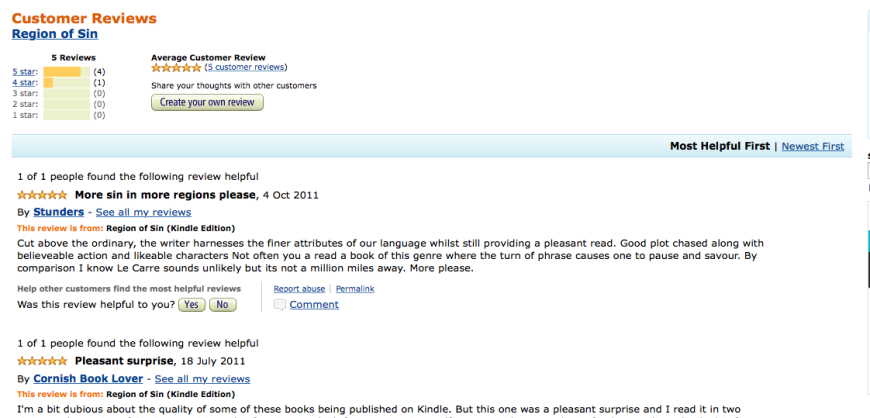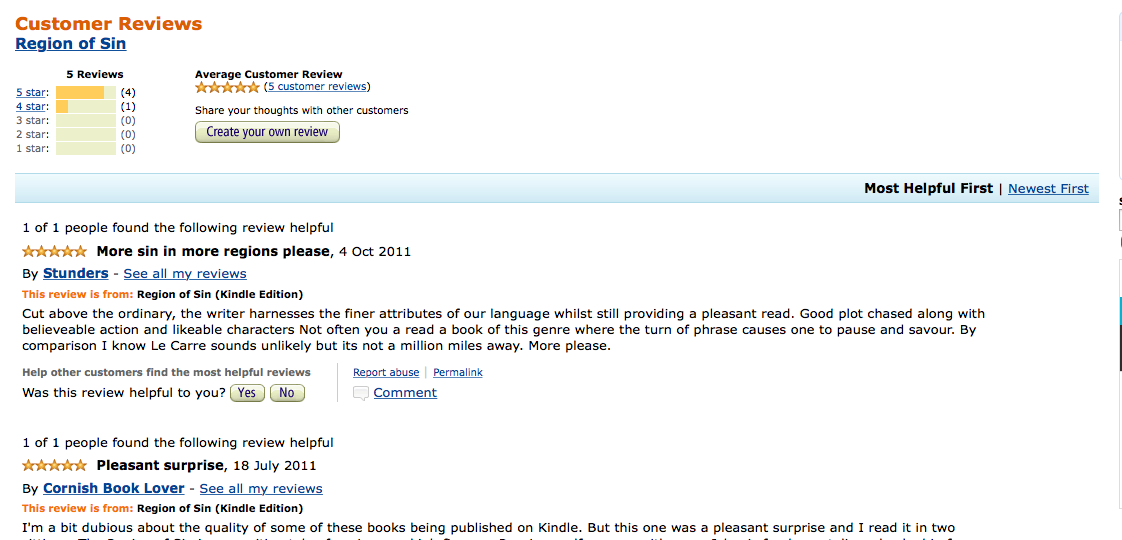Mark Pack is addicted to writing Amazon reviews. But what are they really for?…
I first started writing book reviews purely for my personal benefit: to help me remember more about the books I had read. Even now, with the subsequent explosion of online reviews, the aspects of a book I most wish to remember often will only be recorded if I write them down, partly because some of my reading interests are a little niche and partly because even in mainstream books what catches my eye is often a little different – even when I think that what has caught my eye is obvious and mainstream.
Compare, for example, my review of The Everything Store: Jeff Bezos and the Age of Amazon with just about anyone else’s. Am I really the only person to have read the book and ended up thinking, “Yes, but why did Amazon take off in the first place instead of any of its then equal looking rivals?” Judging by the other reviews, it would appear so.
That regular difference of perspective is what makes posting reviews up on Amazon so fascinating – seeing how others react to them. I partly do it to pay something back to the community as I know how much I benefit from other people’s reviews. Partly too out of habit (aka the kind word for addiction). Hence my reviews of lightbulbs, though one made it to the national press briefly – a little less obscure than expected.
There’s also always the knowledge that amongst the many varied people online perhaps someone else out there is looking for the same piece of information as I have to impart, and hence reviewing an electronic product years after it was discontinued may yet be of use to someone else. It is like with blogging answers to IT problems or revelations about dodgy phone numbers making PPI scam calls. You might think ‘surely lots of people have already said this?’ but scan the search traffic and surprisingly often it is only online if you put it online yourself – and there are then people when then come to read it.
Hence the popularity of my quick throw away comment about label quality and, less surprisingly, or my warning against reading the back cover of a DVD before watching it else you’ll be told a key plot twist.
Amazon does not give you traffic figures for your reviews, but you do get to see how many comments they have attracted and, more importantly, the average rating others have given it.
The question prompting the rating is neatly worded, “Was this review helpful to you?” – not “Do you agree with this review?”. “Helpful” is key because, in theory at least, a review you disagree with completely can still be extremely helpful. In various forms I’ve read reviews saying people did not like films because they were subtitled, did not have much in the way of special effects and had lots of dialogue. Knowing that someone dislikes a film for those reasons is helpful – because it tells me that while they didn’t like it, I may well like it. The review is helpful even as I disagree with it.
But the psychology of the voting button doesn’t quite work perfectly. There is still something that holds you back from being too keen on giving a positive reaction to a review whose views are just too, well, wrong. Maybe only wrong in your view. But the voting button is there to capture your view.
It is that which I think (I hope) explains some of the reviews of mine which appear puzzlingly unpopular. Take my review of The Prestige which has bombed with, at time of writing, just 3 out of 10 people saying they found it helpful: “I agree with a lot of the comments made by the positive reviews here, but in the end I found this a disappointing book – because although it is a mystery thriller, in the end the key plot twist relies on something completely unrealistic, even if it is dressed up in vague scientific terms. I feel that’s cheating on the reader – building up the tension, creating a mystery and then using the implausible and unrealistic to resolve the plot line.”
Is the review really that bad? As the one comment on it hints at, clearly some people enjoy thrillers which ‘cheat’ the reader I this way, though many authors go to great lengths to ensure internal logic to their stories which lets readers have a chance at working out what is going on. Even if you disagree with my view, haven’t I just been helpful in pointing out which sort of book it is?
Perhaps I’m fooling myself about the review, but I suspect people have been giving it the thumbs down because they disagree with me about the sort of book they enjoy.
Similarly with my review of The Meat Fix which is currently languishing with just 3 out of 7 finding it ‘helpful’. You might expect me to say this, but it still reads to me like a pretty handy summary of the key factors of the book that may make you enjoy or it or dislike it. Perhaps it’s the easy way out, but I suspect the review suffers from being about a book that polarises readers and is neither very positive nor negative about it. Stuck in the middle, not quite satisfying anyone. (No political parallels please…!)
But that is a problem about far more than mere book reviews penned by me. Far too much of our evaluation of the works of other starts with ‘do I agree with this?’ and ‘does it fit my pre-existing views?’ rather than ‘has it made me think?’.













I long ago learned to take Amazon reviews with a pinch of salt – I think it was after the purchase of the book ‘Shantaram’ which was universally applauded as an intelligent read in the reviews, but which turned out to be the literary equivalent of a Jean Claude van Damme film.
I haven’t bought from Amazon in years, thinking poorly of it for the way it sets and enforces the terms publishers may have. The railroad agent in The Octopus who identified the principle as “all the traffic will bear” had nothing on Amazon. So I regard it as wrong to use their services to review books I haven’t bought from them.
The reviews would persuade me, if I needed persuading, that an awful lot of people read not to made to think but to feel warm and fuzzy. My most recent review was a one-star, and in flipping through the skinny roster of them for the book (about 100, compared to nearly 5000), I was interested to see several positive reviews–maybe they are Texans, and associate a lone star with greatness. As for my snide comments, 13 of 36 persons thought them helpful.
Worm: generally I’m pleasantly surprised (or rather reminded as it’s no long such a surprise) that the reviews which are more than just a sentence or two tend not to particularly value ‘dumbed down’ works over highly erudite ones. There’s a huge mix of views, reflecting no doubt the range of different tastes but I find that if I want, say, a few quick starting prompts about why a film highly rated for its artistic endeavours is viewed so highly, then there’s usually at least a handful of good reviews which do just that.
George: being made happy by a book (or film, play etc.) is for me a perfectly decent objective both for an author and a reader. It’s only one of several possible decent objectives, of course, but because a book achieves one or more but not others doesn’t make it a bad book or the reader a bad reader.
It’s certainly a shame if people never rate being made to think, but it would also be a pretty unappetising and one-dimensional world if that’s the only objective that makes a book be rated “good”.
(I’ve no idea if this is your view, by the way – forgive me for taking your comment as a starting point for a digression!)
Mark, with the book I refer to it was a matter of being unable to think and read happily at the same time. The author’s grasp of her topic reminded me of Mark Twain on James Fenimore Cooper: He saw nearly all things as in a glass eye darkly.
A while back, I walked into a co-worker’s office, and found not the co-worker but her sister, reading one of the Little House on the Prairie series; she remarked that she found children’s books comforting to read. That I understood, and I will say that I have enjoyed re-reading some books I enjoyed at the age of 10 or 12. But Laura Ingalls Wilder did not have her characters exclaiming “OMG!” or sending texts, or referring to Abraham Lincoln’s senate term, which would have been roughly analogous to the sins of the book I speak of.
So perhaps I should say that a book need not make one think, but it should not require that one quit thinking to read it without annoyance.
Very true!